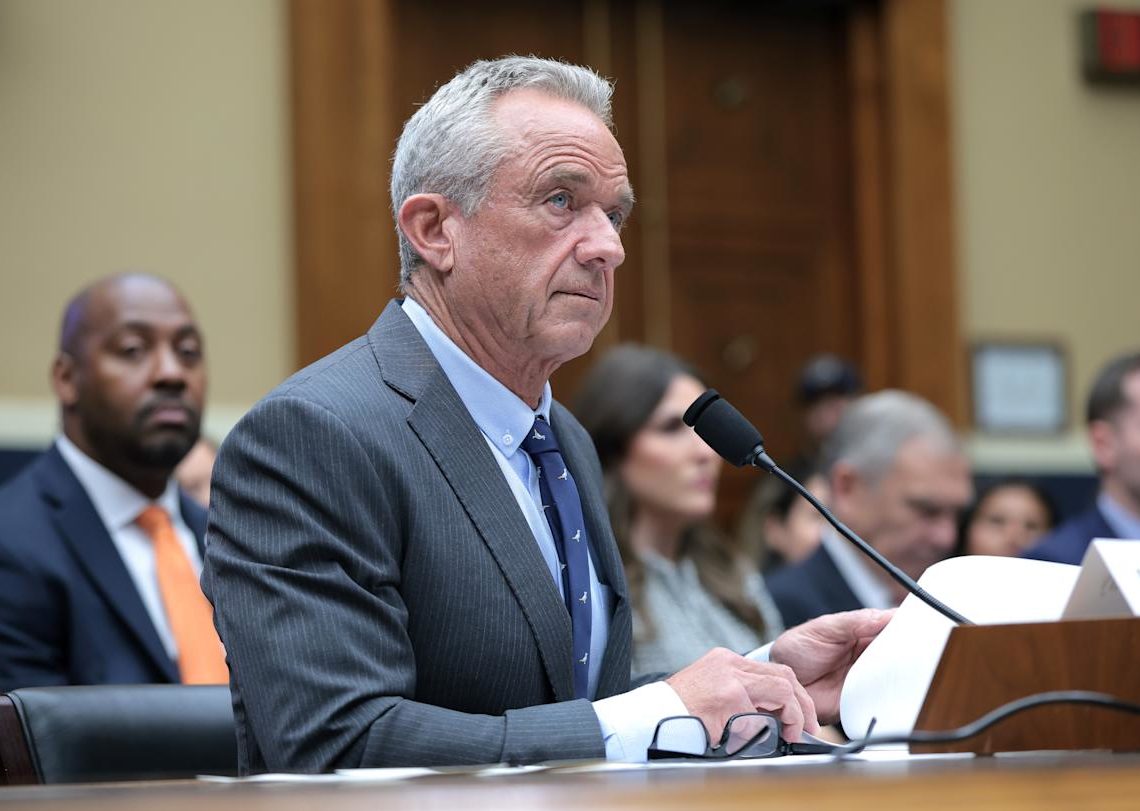Professional medical societies, pharmacists, state health officials and vaccine manufacturers, as well as a new advocacy group, are mobilizing behind the scenes to preserve access for vaccines as Health Secretary Robert F. Kennedy Jr. works to upend the nation’s decades-old vaccine system, according to public health experts.
The groups are discussing ordering vaccines directly from manufacturers and giving greater weight to vaccine recommendations from medical associations. And they are asking insurance companies to continue covering shots based on professional societies’ guidance instead of the federal government’s, according to more than a dozen people familiar with the conversations, including some who spoke on the condition of anonymity to share private discussions.
The moves come as Kennedy has replaced members of the key federal vaccine advisory panel to the Centers for Disease Control and Prevention that decides which vaccines are recommended for whom and whether they’ll be covered by insurance. Kennedy fired the 17-member committee earlier this month and handpicked eight new members, several of whom are vaccine critics.
But the extraordinary effort to create parallel systems of recommending, and perhaps even providing, vaccines faces major challenges, and some of the more ambitious goals have yet to be ironed out.
There is no guarantee that health plans will cover every shot without guidance from the CDC panel, known as the Advisory Committee on Immunization Practices, or ACIP. States, which determine school vaccine entry requirements, may make different decisions. And potential competing recommendations could sow confusion among doctors as well as patients if it becomes unclear which recommendations to follow.
The impact of ACIP is wide-ranging. In addition to insurance coverage, its decisions – which must receive final approval from the CDC director – affect the ability of pharmacists to administer vaccines, as well as a government program ensuring roughly half of children in the United States can get vaccines free.
Public health and medical experts have for months raised alarms over Kennedy’s ascent to the nation’s top health post, expressing concern over his lengthy history of disparaging vaccines. Kennedy, the founder of a prominent anti-vaccine group, secured enough Republican support for the position by pledging to protect the public health benefit of vaccination. But medical and public health experts argue the nation’s vaccine system is beginning to fracture under Kennedy’s leadership.
Their efforts to create a nongovernmental vaccine system marks a significant escalation in strategy, reflecting the high degree of alarm within the mainstream medical and public health community about continued access to immunizations that have long been recommended by federal health officials.
The American College of Physicians, one group involved in the talks, said Kennedy’s recent changes to the ACIP and lack of transparency in the process “puts at risk decades of progress in vaccine development, access, and public trust, and contributes to confusion and uncertainty.”
If the panel departs from long-standing recommendations, “we will need to look elsewhere for reliable information guided by the best-available evidence to guide the use of vaccines,” said Jason Goldman, the group’s president, in a statement.
HHS spokesperson Andrew Nixon said the agency and CDC “remain committed to ensuring that vaccine guidance is rigorous, independent, and truly in service to the health of the American people – not corporate interests.” He called one of the coalition’s leading organizations “a self-appointed echo chamber masquerading as oversight.”
“Led by establishment insiders, it’s less about integrity and more about salvaging the credibility of a public health bureaucracy that failed millions during the covid-19 pandemic,” Nixon said in a statement. “ACIP will continue to be the statutory authority guiding immunization policy in this country.”
The newly reconstituted ACIP is scheduled to hold its first meeting Wednesday and Thursday. The draft agenda no longer includes policy discussions that were scheduled for this month, such as a vote on who should get a coronavirus vaccine. Instead, last-minute items have been added that “have long been cornerstones of vaccine falsehoods among vaccine skeptics,” Katelyn Jetelina, a California epidemiologist, wrote Friday in her weekly newsletter about infectious disease.
A former leader of the anti-vaccine group Children’s Health Defense – which Kennedy founded – is scheduled to give a presentation Thursday on the preservative thimerosal in some flu vaccines, according to two people who were told about the presentation and spoke on the condition of anonymity for fear of retaliation. Children’s Health Defense CEO Mary Holland said that the official “has no current role” with the group and was “past president.” Its inclusion suggests the panel wants to revisit long debunked claims linking the preservative to autism. Kennedy has a history of pushing the discredited claim that vaccines cause autism.
Thimerosal was added to some vaccines decades ago to prevent bacterial contamination in multi-dose vials. By the early 2000s, it had been removed or reduced to trace amounts in most childhood vaccines, with manufacturers increasingly using single-dose vials that did not require preservatives. It remains in some multi-dose influenza vaccines, according to the CDC.
– – –
The quest to vaccinate America
The Vaccine Integrity Project, a recent initiative based at the University of Minnesota, is leading many of the discussions to explore alternatives with vaccine manufacturers, health insurers and medical associations. The project is consulting with, among others, the American Academy of Pediatrics, the American Academy of Family Physicians, the American College of Physicians, the American Pharmacists Association, the National Foundation for Infectious Diseases, as well as insurance providers.
“We’ve had discussions across the board from everyone across the vaccine enterprise, from [research and development] to the person who delivers the needle,” said Michael Osterholm, a University of Minnesota infectious-disease expert who advised President Joe Biden’s transition team and helped launch the initiative. The project does not receive funding from industry; it has received an unrestricted gift from a foundation established by philanthropist Christy Walton, an heir to the Walmart fortune.
ACIP, CDC and Kennedy have created an uncertain environment, and project leaders are bracing for what they say would be the worst: the removal of vaccines from the recommended CDC list of routine immunizations for children and adults. That list includes vaccines for chicken pox, measles and polio.
“Vaccine misinformation has increased in recent years, and that’s a concern to me,” said Asa Hutchinson, the former Republican governor of Arkansas and a member of the Vaccine Integrity Project’s steering committee. “I think everyone’s goal is to have accurate information for the public and have it scientifically based and to make sure that our public health infrastructure is strong.”
Hutchinson, who led Arkansas amid the coronavirus pandemic, said he does not believe Kennedy thus far has changed vaccine policy beyond rollbacks on coronavirus shot recommendations. “It remains to be seen as to how the newly formed ACIP is going to act,” he said.
Political pressure on Kennedy could increase if his moves reduce access to routine vaccinations, public health experts said.
“The moment vaccines become harder to get for the schoolteacher and firefighter in Allentown, Pennsylvania, … or it’s gotten expensive, that’s where the politics of this changes,” said Ashish Jha, the White House covid-19 coordinator under the Biden administration.
Two CDC scientists resigned after Kennedy’s unilateral decision to remove coronavirus vaccination recommendations for healthy children and pregnant women and his firing of ACIP members. One told colleagues she felt she could no longer help vulnerable people. Another said she was stepping down because she is no longer confident that data on covid- 19 and other respiratory illnesses would be used objectively to set vaccine policy.
– – –
A complex web of vaccine access and coverage
Introducing a new player into the nation’s vaccine system promises to be complicated, given the patchwork of state laws and the federal government’s traditional role. Many state laws governing school entry requirements and vaccination requirements for hospitals and health care workers are often tied to ACIP recommendations. There are nearly 600 references or citations related to ACIP in the laws or regulations of 49 states, according to an analysis by the Association of State and Territorial Health Officials.
Some states are considering forming their own vaccine advisory groups. Officials from Maine, Rhode Island, Connecticut and New York are discussing a possible regional group for northeastern states, according to two state health officials who spoke on the condition of anonymity because talks are ongoing.
Wisconsin said earlier this month it would continue to recommend the coronavirus vaccine because Kennedy-directed changes to CDC guidance “were not made based on new data, evidence, or scientific or medical studies, nor was the guidance issued following normal processes.”
But each state going its own way is not ideal. “The biology of people is not different state to state,” said Anne Zink, an Alaska emergency room physician and member of the Vaccine Integrity Project. “We should be looking to the major medical associations,” Zink said.
Roughly 30 states’ regulations tie the ACIP schedule to whether Americans can get a certain vaccine at the pharmacy counter. Major pharmacy associations are planning to send a letter in the coming days to health plans urging them to maintain coverage, according to Brigid Groves, the vice president of professional affairs at the American Pharmacists Association. They are also crafting draft emergency orders governors could issue allowing pharmacists to continue administering certain vaccines if the federal guidance were to change.
Insurers cover vaccines that are on the CDC’s immunization schedule, generally, even if they are considered “shared clinical decision-making,” meaning children can get vaccinated if their parents and doctors agree.
“Health plans continue to follow federal requirements related to coverage of ACIP-recommended vaccines and will continue to support broad access to critical preventive services, including immunizations,” Tina Stow, a spokeswoman for AHIP, the major insurer lobby, said in a statement to The Washington Post.
Recommendations of medical societies and scientific evidence will weigh on insurance coverage decisions, according to two people involved in the insurance industry who spoke on the condition of anonymity to detail sensitive discussions.
“Insurers are absolutely trying to find ways to cover services that are so widely understood as beneficial and proven,” said a former insurance industry executive who spoke on the condition of anonymity to be candid. “I wouldn’t want to be the first insurer to start to decline coverage for what are clearly incredibly important and valuable public health interventions.”
– – –
Lauren Weber contributed to this report.
Related Content
3-pound puppy left in trash is rescued, now thriving
How to meet street cats around the world
‘Jaws’ made people fear sharks. 50 years later, can it help save them?
The post How medical groups may preserve vaccine access — and bypass RFK Jr. appeared first on Washington Post.



